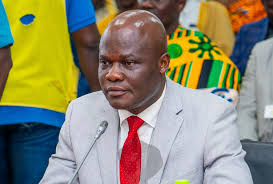The Minister-Designate for Local Government, Chieftaincy, and Religious Affairs, Ahmed Ibrahim, has outlined an ambitious plan to tackle longstanding challenges in his ministry, focusing on decentralization, revenue generation, and infrastructure development.
During his vetting before the Appointments Committee on Tuesday, January 21, 2025, Mr. Ibrahim emphasized the importance of leveraging property rights to enhance the financial capacity of Metropolitan, Municipal, and District Assemblies (MMDs).
He criticized the past centralization of property rates collection, which he argued had hindered revenue generation efforts.
Mr. Ibrahim pointed to the role of traditional authorities, MPs, and District Chief Executives (DCEs) in ensuring the success of this plan.
“One critical area that we can do the low-hanging fruit to make sure that we improve upon the funding of the MMDs is property rights. So if my brother is asking of just one or two examples, the third example should be property rights. And, Mr. Chairman, we were in this house when the budget was passed and property rights was centralized, taking that core function from the MMDs.”
He stressed that collaboration among all stakeholders would be crucial to achieving sustainable economic growth in districts across the country, with another major focus on the District Road Improvement Programme (DRIP), a project designed to enhance local road infrastructure but marred by procurement challenges.
Mr. Ibrahim revealed that a lack of proper management contracts and monitoring systems had stalled the programme, revealing that “And therefore, there were challenges at birth. And he’s asking, how am I going to pursue it? Mr. Chairman, every district chief executive watching me, workers in the Ministry of Local Government watching me, will testify that they have no records of any agreement of the DRIP project.
“And they have no program, no inventory of all the DRIP machines. This is a challenge, because it was highly procured at the big house, not the Office of the President. So that brought a problem. And therefore, one, there is no management contract.”
“And therefore, if given the nod, together with my brother, who used to be in the Ministry, and together with my team, who will be the technocrat at the Ministry, we all work together to make sure that the DRIP program is materialized. Because the machines were procured to improve upon these three rules that are not had. And much money was used.”
On sanitation, the minister-designate proposed integrating the sanitation ministry into local governance to streamline operations and improve oversight. He underscored the importance of monitoring and supervision in managing sanitation issues at the district level.
“Waste practitioners or workers are available in every district and municipality. And therefore, the presence of the sanitation ministry will be properly placed in the Ministry of Local Government because they have their presence in every district. And once that is done, the problem may not be about contract, it may be about supervision and monitoring, he noted.
Read also: Parliament Approves First Two Sets of Ministerial Appointments
Source: Comfort Sweety Hayford/ATLFMNEWS




























